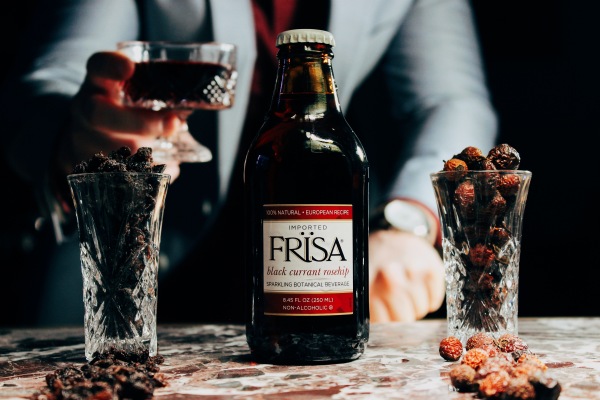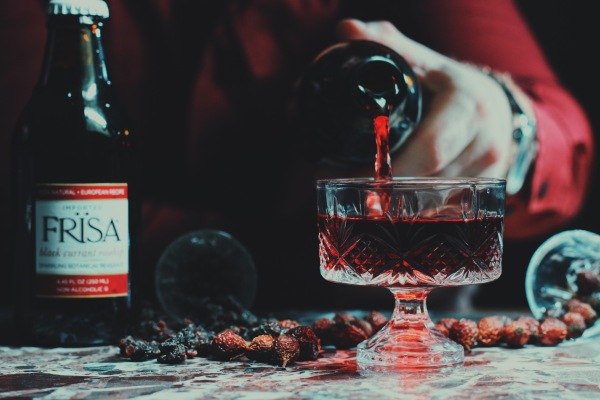History: You want some of that fancy soda? That stuff that makes you wanna throw on a robe and a crown and just do the Vince McMahon strut down the street as you drink it? Boy, do we have a beverage for you. Frïsa touts itself as “an ultra-premium European botanical beverage,” according to company general manager and COO Casey Beard. Do you already not feel a little more regal just having read that? Beard continues saying, “all of our ingredients are all natural, gluten free, non-GMO and Kosher certified. We made sure we used the best of the best when crafting FRÏSA… even our water is sourced from the Pyrenes.” Hold on. What? That’s right. Mountain water. European mountain water from the Iberian Peninsula is in every cute, stubby bottle. Ironically, Frïsa is not produced in Europe, but rather the cold tundra of Minneapolis, Minnesota and it was founded in early 2015. Each drink is also under 100 calories per serving. But what separates Frïsa from other sodas is the botanicals it uses. Botanicals usually refer to ingredients like herbs, spices, or floral notes that impart a unique flavor not often found in most soda. And Beard doesn’t hide the fact that his company is trying to be different. “We saw the need and opportunity for an alternative to the Cokes and Pepsis of the world but needed to put a spin on it,” he tells us. Frïsa’s most popular flavor is Elderflower, but its most interesting flavor in our opinion is black currant rosehip. Here’s the thing: we don’t know what black currant is, much less how it tastes. Beard lets us know we aren’t crazy, saying that black currant is a “more common ingredient in Europe where it is widely cultivated and consumed,” before adding that its best American comparison is the blackberry or marionberry. He calls the drink “refined and sophisticated,” yet “light and refreshing.” Listen, I’m already on my high horse so you don’t have to sell me on drinking it or the aesthetics. I just hope my taste buds get treated with a similar royal experience.
Buy: Frïsa Store
Nose: Strong grape juice smells, though a little bit more of a sophisticated grape/berry scent, ala wine.
Taste: Tart; berry; grape; light cherry; tangy; frothy. The standouts in this soda are the frothy carbonation combined with a strong tartness. The two contrast one another nicely. The flavor is something along the lines of a tangy grape and black cherry hybrid floating on a cloud of thick, but soft carbonation. The tartness comes from the use of lemon juice, but you don’t really taste lemon, per se. That tart and tangy flavor manifests itself in the form of a berry taste. There’s also just the faintest hint of floral notes. Like a grown up carbonated grape juice with an infusion of cherry.
Finish: Berry tartness that slowly fades in favor of light floral notes.
Rating: Frïsa continues to cement itself as an artisan soda brand of the future. The company walks a fine line of soda vs. carbonated juice, but that’s only because the flavors they use taste so fresh. Black currant rosehip is no exception. If there was ever such a thing as fresh-squeezed soda, this is it. The flavors are bold and bright. You’ll taste a hybrid grape and dark berry flavor with an accompanying cherry kick. But what stands out most is the tartness. It’s the shining star of the soda. It intensifies all of the flavors in the bottle in a positive way. It’s tangy, but not sour. For some, this may be a little too acidic, but I think for most it’ll be a refreshing new take on berry soda. The one area I’d like to see improved is the floral taste on the soda’s finish. I need to taste that a little bit more in the soda’s body before I can give this five stars. If you didn’t tell people there was rosehip natural extract in this soda, most wouldn’t even notice it. Beyond that, Frïsa’s black currant rosehip is fruity, sophisticated, and bold. It’s like simultaneously visiting the vineyards of California and the beaches of Miami at the same time, yet not coming back with an overpriced bottle you’ll never drink or a tattoo you’ll always regret. The bottom line is that this young company makes good stuff and black currant rosehip continues the trend.





